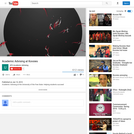
This video explains the concept of academic advising at the UFS.
- Subject:
- Education
- Material Type:
- Teaching/Learning Strategy
- Provider:
- University of the Free State
- Date Added:
- 01/15/2015

This video explains the concept of academic advising at the UFS.
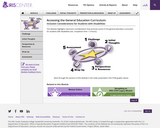
This Module highlights classroom considerations that promote access to the general education curriculum for students with disabilities (est. completion time: 1.5 hours).

Additional materials for custom math teaching. Exercises for different skill levels.

Additional materials for custom math teaching. Exercises for different skill levels. Πρόσθετο υλικό για προσαρμοσμένη διδασκαλία μαθηματικών. Ασκήσεις για διαφορετικά επίπεδα δεξιοτήτων.
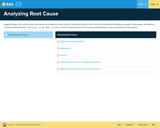
Reflection questions are offered at two levels:
1. District and school level, for system-wide reflection, appropriate for district
administrators, building principals, department chairs, content lea ders, coaches
2. Teacher level, appropriate for individual teachers in considering their
data/information
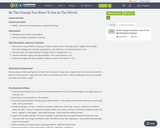
Lesson outcomesSWBAT: demonstrate characteristics of good citizenship. AssessmentMonthly questionnaires and evidenceFinal presentation and project showcaseState Standards, Indicator, ObjectiveDescribe the responsibilities of being an effective citizen, such as cleaning up your neighborhood, being informed, obeying rules and laws, participating I class decisions, and volunteering (3.1.0.1a)Describe rights and responsibilities of being a citizen in Maryland (4.1.0.1)Describe individual rights and responsibilities in the United States (5.1.01)Examine the rights and responsibilities of being a citizen in the world (7.1.0.1)
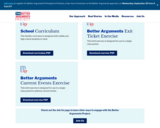
Better Arguments can help students learn to engage productively across differences and grapple with differing viewpoints. Linked are resources that are applicable to school-based learning activities and after school programs. These include a curriculum, exit ticket exercise and current events exercise.
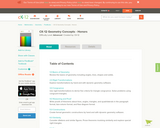
This Geometry Concept Collection is a rigorous presentation of high school geometry. It is fully correlated with the Common Core State Standards.
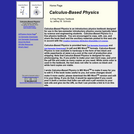
A free, two-volume, on-line, editable, introductory calculus based physics textbook in PDF™ and Microsoft Word™ format. Also provides ancillary materials including video solutions to physics problems and Blackboard™ quizzes with extensive feedback.
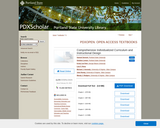
This online textbook addresses the population of individuals with disabilities that experience complex lifelong needs across multiple areas in their lives. Drs. Sennott and Loman drafted this book (along with the help from some friends) with the hope of providing pertinent, practical, and current resources to future special educators who plan to serve individuals with complex disabilities.
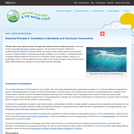
The concepts that underlie the fourth essential principle of climate literacy ("Climate varies over space and time through both natural and man-made processes.") are too complex for students in early and upper-level elementary school, but the foundational knowledge can be taught within existing curriculums and standards. This foundational knowledge will lead to understanding in later years. The author shows the correlation to the national science education standards, identifies misconceptions among elementary school students, suggests formative assessment probes, and identifies lessons and activities to make curriculum connections. The free, online magazine Beyond Weather and the Water Cycle is based on the seven essential principles of the climate sciences.

Curriculum, Assessment and Management 1 Open Resource Adaptations
ED 622 Curriculum, Assessment and Management I
Course will help students to develop assessment, instructional and management strategies in the planning, implementation and evaluation of instruction in various classroom settings using the framework of teacher work sampling. The basics of lesson planning, instructional methods, assessment planning, differentiation and classroom management will be covered.
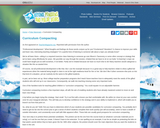
This article describes how curriculum compacting can be used to meet the needs of gifted students within the regular classroom.
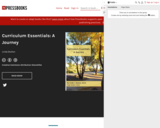
The purpose of this book is to acquaint the reader with what curriculum is, how it is defined, what is involved in the process of its development, the different types and models of curriculum, as well as innovations to make teaching and learning more engaging and meaningful. This will be balanced by the impact of assessment and adapting curriculum in times of challenges with an eye towards the work of great schools and master teachers during times of change.
The inclusion of Open Educational Resources (OER) provide a new and exciting dimension to the text through the inclusion of educational resources from experts who have graciously consented to share their work with others at no cost, thereby giving all readers the opportunity of learning about curriculum without the burden of cost as a barrier that shuts out capable and enthusiastic learners from gaining the knowledge and skills necessary in becoming thoughtful consumers and practitioners of curriculum.
Each chapter has a short introduction followed by essential questions that are designed to pique the reader’s interest, then by content that will reveal answers to the questions and enhance the reader’s curriculum knowledge base through interactive learning activities (ILA).
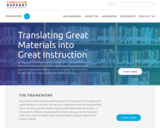
Instruction Partners' Curriculum Support Guide offers a straightforward example of what systems can do to improve instruction and achievement by selecting, launching, and supporting high-quality curriculum, detailing what it means and what it takes to successfully implement exceptional materials. This workbook is designed to help a school or system leadership team work through the implementation process together.
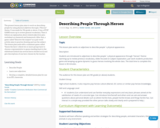
The present lesson plan aims to work on describing people by using physical adjetives through a "Heroes" theme. It was made for 9th grade or above. It has a STOP GAME warm-up to review general vocabulary. Then it follows an explanation about related adjectives plus worksheet as classwork and homework. After that, a game called "Descrive the suspect" as a pair-work activity aims to practice drawing and use the subject. The lesson plan ends with a culminant game called "Guess the hero", which two or more groups have to choose a representative to guess standing back to the whiteboard (which has several heros sticked on it) and give descriptions of one hero chosen by the teacher.

Este recurso ha sido desarrollado para la Facultad de Ciencias Químicas y Farmacia de la Universidad de San Carlos de Guatemala. Consiste en un video que muestra el proceso de diseño curricular por competencias, desde una visión sistémica que incluye la entrada, proceso y salida.
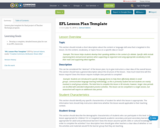
Lesson plan template for final project of Teacher Exchange program.
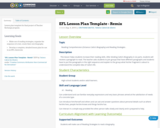
Lesson plan template for final project of Teacher Exchange program.
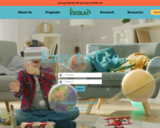
ESCOLAR aims to offer ALL elementary and middle-school students the opportunity to learn science within an engaging online environment.